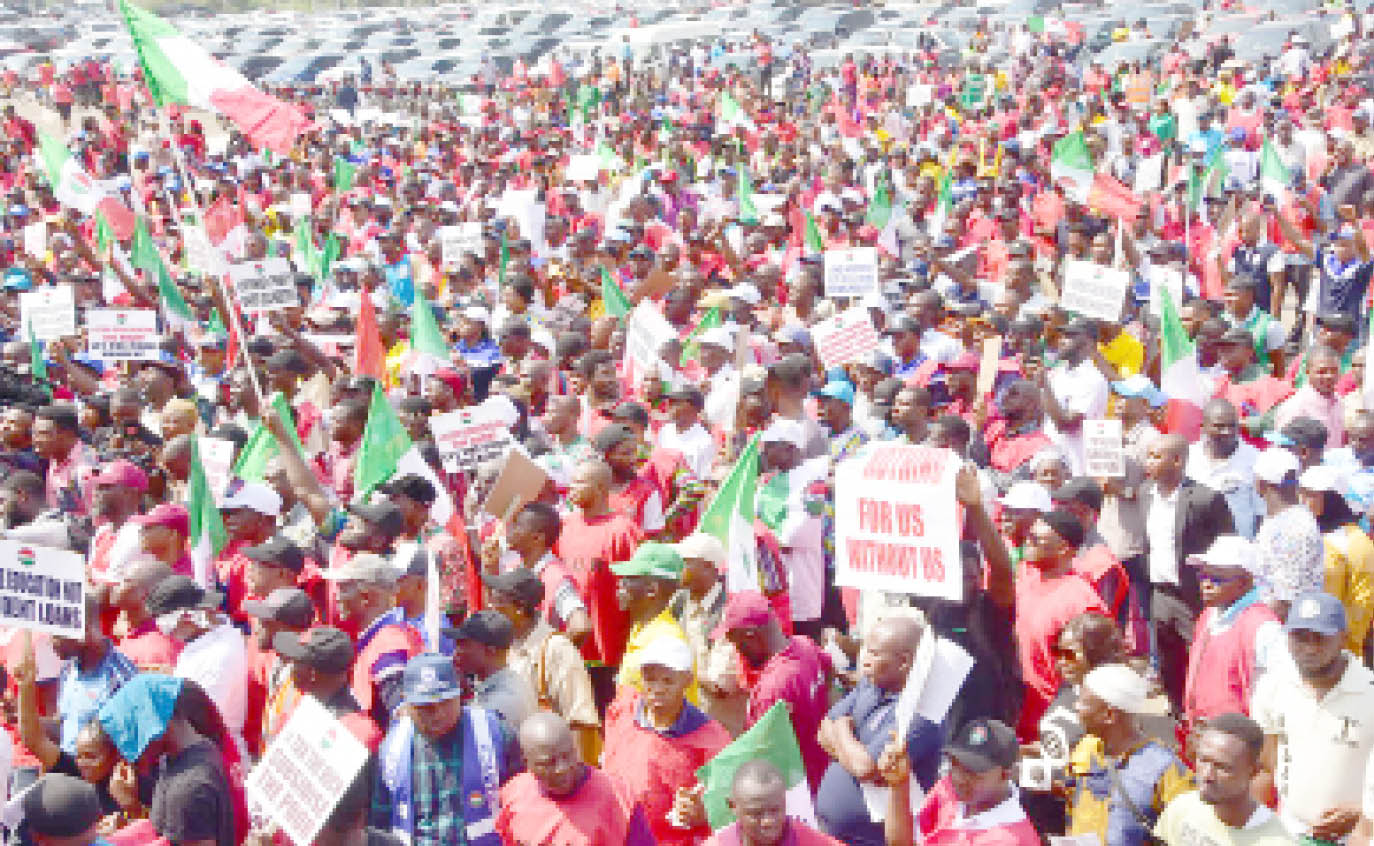Why Protests Haven’t Been a Successful Tool in Nigeria
By Kunle Lawal In recent years, Nigeria has witnessed a surge in protests, with the #EndSARS movement being one of the most prominent examples. While these protests have garnered significant attention and mobilized a substantial portion of the population, they have not always translated into the desired changes. This lack of success can be attributed […]

NLC members protesting againsts cost of living crisis at the National Assembly Complex, Abuja yesterday
By Kunle Lawal
In recent years, Nigeria has witnessed a surge in protests, with the #EndSARS movement being one of the most prominent examples. While these protests have garnered significant attention and mobilized a substantial portion of the population, they have not always translated into the desired changes. This lack of success can be attributed to several factors, including a lack of a calculated trajectory and a poor understanding of the political system.
The #EndSARS movement, which called for the disbandment of the Special Anti-Robbery Squad (SARS) due to its notorious brutality, quickly gained momentum across the country. Thousands of young Nigerians took to the streets, demanding justice and reforms. However, despite the initial victories, such as the disbandment of SARS, the movement did not achieve its broader goals of systemic reform and accountability. One major reason for this was the lack of a clear, strategic plan. The protestors did not have a concrete roadmap outlining their demands and the steps needed to achieve them. This absence of a calculated trajectory led to a situation where the government could make superficial concessions without addressing the underlying issues.
Moreover, a poor understanding of the political system significantly hampered the movement’s success. Many protestors did not fully grasp the intricacies of governance and the bureaucratic processes involved in implementing reforms. This gap in understanding made it difficult to engage effectively with policymakers and to hold them accountable. Without a deep knowledge of how the system works, protestors were unable to navigate the political landscape effectively, leading to frustration and disillusionment when their demands were not met.
The #EndSARS protests are not the first to face such challenges. Other significant protests in Nigeria have also struggled to achieve their goals due to similar issues. For instance, the fuel subsidy protests of 2012, also known as Occupy Nigeria, mobilized millions against the government’s removal of fuel subsidies, which had led to a sharp increase in fuel prices. Despite the massive turnout and public support, the protests failed to secure long-term policy changes. The government made temporary concessions, but the underlying issues of corruption and inefficiency in the petroleum sector remained unaddressed. The protestors lacked a clear, unified agenda beyond the immediate reversal of the subsidy removal, and once the initial fervor died down, the movement lost momentum.
- Shun protest, change bad govt through ballot, Kwankwaso tells Nigerians
- Nationwide protest: Wisdom cue for Tinubu?
Similarly, the Bring Back Our Girls campaign, initiated in response to the abduction of schoolgirls by Boko Haram in 2014, garnered international attention and widespread support. While it succeeded in drawing global attention to the plight of the kidnapped girls and pressuring the government to take action, it did not lead to significant policy changes regarding security and the protection of vulnerable populations in Nigeria. The campaign highlighted the government’s inadequacies but lacked a strategic plan for sustained advocacy and policy reform.
Another critical issue is that many Nigerians are more enamored with the euphoria of protests than the actual struggle to achieve tangible outcomes. The excitement and unity experienced during protests can create a powerful sense of solidarity and hope. However, this often fades when the hard work of advocacy, negotiation, and policy-making begins. Protests are just the beginning of a long and arduous journey towards change. The real challenge lies in sustaining momentum, building coalitions, and engaging in the often tedious process of political and legal reforms. Unfortunately, many movements lose steam when the initial enthusiasm wanes, and the hard work of achieving systemic change begins.
For protests to be more effective in Nigeria, it is crucial to develop a more strategic approach. This involves setting clear, achievable goals and creating a detailed plan to achieve them. Protestors must also invest time in understanding the political system and building relationships with key stakeholders. Advocacy should not end when the protests do; it should continue in the halls of power, in the form of lobbying, engaging with lawmakers, and participating in the democratic process.
Furthermore, there needs to be a shift in mindset from the euphoria of protests to the sustained struggle for change. This means recognizing that real change requires patience, persistence, and a willingness to engage in the less glamorous aspects of activism. It involves educating oneself and others about the political system, building coalitions, and being prepared for a long-term commitment to the cause.
The #EndSARS movement has shown that Nigerians are ready and willing to fight for justice and reform. However, to turn this readiness into real change, we must adopt a more strategic and informed approach to activism. By doing so, we can ensure that our efforts are not in vain and that we achieve the meaningful, lasting reforms that Nigeria so desperately needs.
Lawal is Executive Director, Electoral College, Nigeria
